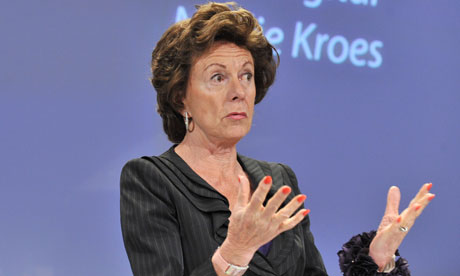Read by 40 people Controversial anti-counterfeiting agreement stalls in face of protests as European commissioner says it is unlikely to pass
The Acta treaty that has been the subject of street protests around Europe is unlikely to be ratified by the European Union, according to Neelie Kroes, the powerful European commissioner for telecoms and technology.
Speaking on Friday, Kroes said that "we are now likely to be in a world without Sopa" – the US's proposed Stop Online Piracy Act – "and Acta."
Acta, the Anti-Counterfeiting Trade Agreement, has been signed by 22 of the EU's 27 countries, as well as the US and Japan. But even in some of the countries that have signed it, parliaments have declined to ratify it due to public pressure.
Ryan Heath, a spokesman for Kroes's office, said the European commission has not changed its position on the usefulness of Acta, and was continuing to work toward its ultimate ratification, but added that Kroes was "observing political reality".
Kroes's comments come weeks before the commission, the EU executive, is due to make public new rules to ensure that musicians and film-makers get paid, and while it is trying to overhaul the bloc's copyright regime to cater for the internet era.
Critics say the commission is holding back planned reviews of the EU's own rules because officials are worried it will come up against the same kind of resistance as Sopa and Acta.
"After the tremendous mobilisation of citizens around the world against Sopa and Acta, it would be extremely dangerous politically for the commission to propose a new repressive scheme," said Jeremie Zimmermann, from internet advocacy group La Quadrature du Net.
Acta is meant in part to provide methods for governments to crack down on fake consumers goods and medicines, and on websites that break copyright laws. It had been moving through the approval process in the European parliament when street protests began breaking out in January over the lack of transparency about its contents – whose drafting was carried out almost entirely in secret for some years – and the breadth of its assault on alleged copyright infringement on the internet.
The EU in April asked its top court in Luxembourg to examine Acta's lawfulness, after politicians and campaigners said the agreement would allow companies to spy on ordinary internet users suspected of downloading copyrighted material. A ruling could take up to a year.
Liberal politicians in the more than 700-seat European parliament have been lobbying fiercely against the agreement. "Although we unambiguously support the protection of intellectual property rights, we also champion fundamental rights and freedoms," Guy Verhofstadt, the leader of the legislature's liberal group, said. "We have serious concerns that Acta does not strike the right balance."
Several governments in the developed world have been pushing for multilateral agreements to ban trademark and copyright theft and ban websites that offer large numbers of copyrighted films and songs for free, such as Kim Dotcom's MegaUpload and The Pirate Bay.


















0 σχόλια:
Post a Comment